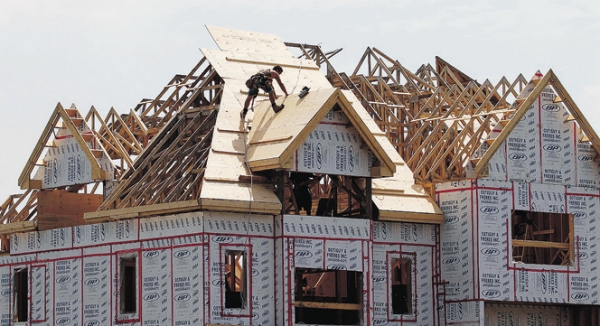Starts decline, prices suffer as HST, interest rates bite
Ka Yan Ng
Province

A builder works on the roof of a new home under construction in the Montreal suburb of Brossard on Tuesday. Canadian housing starts fell in July for a third-straight month and new-home prices rose less than expected in June. Starts fell 1.6 per cent in July. Photograph by: Reuters, Reuters
Canadian housing starts fell in July for a third-straight month and new-home prices rose less than expected in June, further evidence that the housing boom that helped drive the country’s recovery from recession is starting to stall.
The reports released on Tuesday are in line with other recent data that has shown that higher interest rates, the introduction of the HST in B.C. and Ontario, and stricter lending rules are weighing on the housing sector.
Housing starts fell 1.6 per cent in July to a seasonally adjusted annualized rate of 189,200 from a revised 192,300 in June, Canada Mortgage and Housing Corp said.
Analysts had forecast 186,500 starts in July. June starts were originally reported at 189,300. B.C. saw its seasonally adjusted rate of urban starts fall by 14.8 per cent between June and July, CMHC said.
“This report confirms that housing has been lost as a driver of growth in the Canadian economy,” Scotia Capital economists Derek Holt and Gorica Djeric said in a commentary.
“There are no [Bank of Canada] implications stemming from this report in our view. The BoC expected housing to cool, and it is being replaced as a growth driver by business investment in machinery and equipment.”
Canada‘s central bank, along with most economists, had forecast residential investment would weaken markedly for the balance of the year.
But though the Canadian housing sector is cooling, it still compares favourably with the U.S. housing sector, which has been unable to help spark the economy.
The CMHC report said a decrease in starts on single-family homes in both urban and rural areas in July more than offset a 13.4-per-cent jump in the volatile multi-unit group in urban areas.
Elsewhere in the housing market, existing-home sales fell 13.3 per cent in the second quarter from near-record levels in the first three months of the year, according to recent data from the Canadian Real Estate Association. Last month the association said it expects lower sales of existing homes in 2010 after previously forecasting a rise.
Tuesday’s housing data follows other recent soft economic figures. The employment report for July last week showed the finance, insurance, real-estate and leasing sectors of the economy dropped nearly 30,000 jobs.
“What we see fitting together is slowing activity in the new-build sector corresponding with declining activity in the existing home-sales sector, which invariably seems to be resonating in job losses in the financial-services sector,” said Stewart Hall, economist at HSBC Securities Canada.
New-home prices climbed 0.1 per cent in June, following identical increases of 0.3 per cent in the previous three months, Statistics Canada data showed.
Prices, which do not include taxes, rose on a monthly basis in nine of the 21 cities surveyed. They were flat in five and declined in seven.
The top contributors to the monthly increase were Toronto-Oshawa with a 0.3-per-cent rise, and a 0.5-per-cent gain in Ottawa-Gatineau. The largest decrease was recorded in Regina, Sask., down 0.4 per cent.
© Copyright (c) The Province

